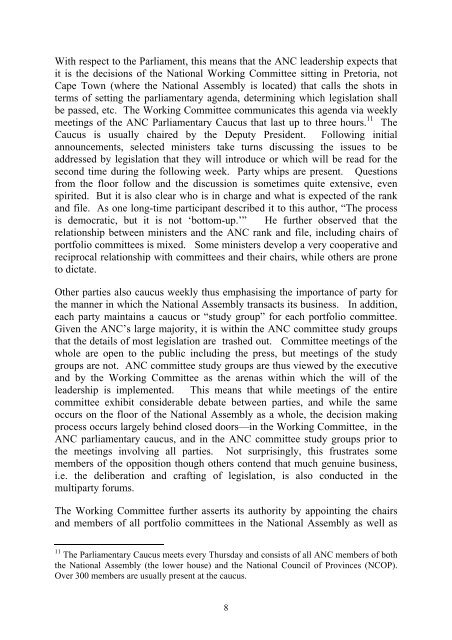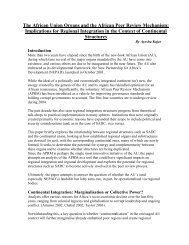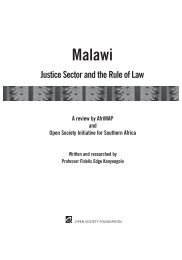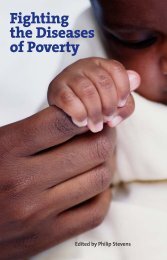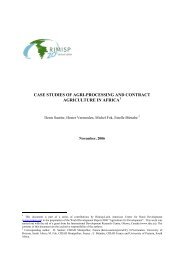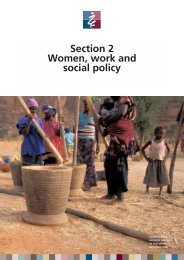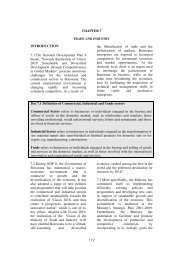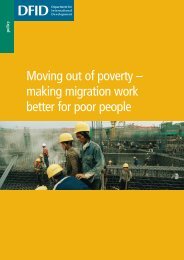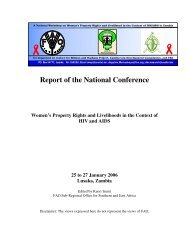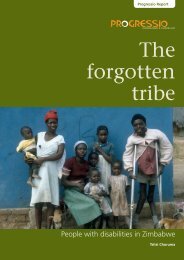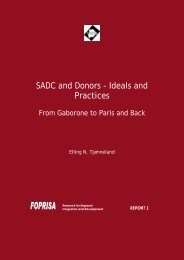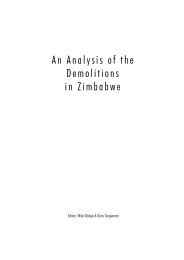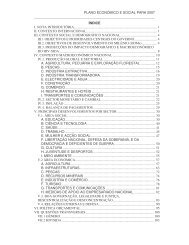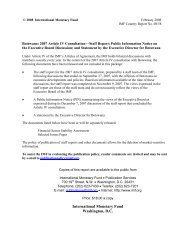400Kb ~ 2 min (33 pages) - SARPN
400Kb ~ 2 min (33 pages) - SARPN
400Kb ~ 2 min (33 pages) - SARPN
Create successful ePaper yourself
Turn your PDF publications into a flip-book with our unique Google optimized e-Paper software.
With respect to the Parliament, this means that the ANC leadership expects thatit is the decisions of the National Working Committee sitting in Pretoria, notCape Town (where the National Assembly is located) that calls the shots interms of setting the parliamentary agenda, deter<strong>min</strong>ing which legislation shallbe passed, etc. The Working Committee communicates this agenda via weeklymeetings of the ANC Parliamentary Caucus that last up to three hours. 11 TheCaucus is usually chaired by the Deputy President. Following initialannouncements, selected <strong>min</strong>isters take turns discussing the issues to beaddressed by legislation that they will introduce or which will be read for thesecond time during the following week. Party whips are present. Questionsfrom the floor follow and the discussion is sometimes quite extensive, evenspirited. But it is also clear who is in charge and what is expected of the rankand file. As one long-time participant described it to this author, “The processis democratic, but it is not ‘bottom-up.’” He further observed that therelationship between <strong>min</strong>isters and the ANC rank and file, including chairs ofportfolio committees is mixed. Some <strong>min</strong>isters develop a very cooperative andreciprocal relationship with committees and their chairs, while others are proneto dictate.Other parties also caucus weekly thus emphasising the importance of party forthe manner in which the National Assembly transacts its business. In addition,each party maintains a caucus or “study group” for each portfolio committee.Given the ANC’s large majority, it is within the ANC committee study groupsthat the details of most legislation are trashed out. Committee meetings of thewhole are open to the public including the press, but meetings of the studygroups are not. ANC committee study groups are thus viewed by the executiveand by the Working Committee as the arenas within which the will of theleadership is implemented. This means that while meetings of the entirecommittee exhibit considerable debate between parties, and while the sameoccurs on the floor of the National Assembly as a whole, the decision makingprocess occurs largely behind closed doors—in the Working Committee, in theANC parliamentary caucus, and in the ANC committee study groups prior tothe meetings involving all parties. Not surprisingly, this frustrates somemembers of the opposition though others contend that much genuine business,i.e. the deliberation and crafting of legislation, is also conducted in themultiparty forums.The Working Committee further asserts its authority by appointing the chairsand members of all portfolio committees in the National Assembly as well as11 The Parliamentary Caucus meets every Thursday and consists of all ANC members of boththe National Assembly (the lower house) and the National Council of Provinces (NCOP).Over 300 members are usually present at the caucus.8


